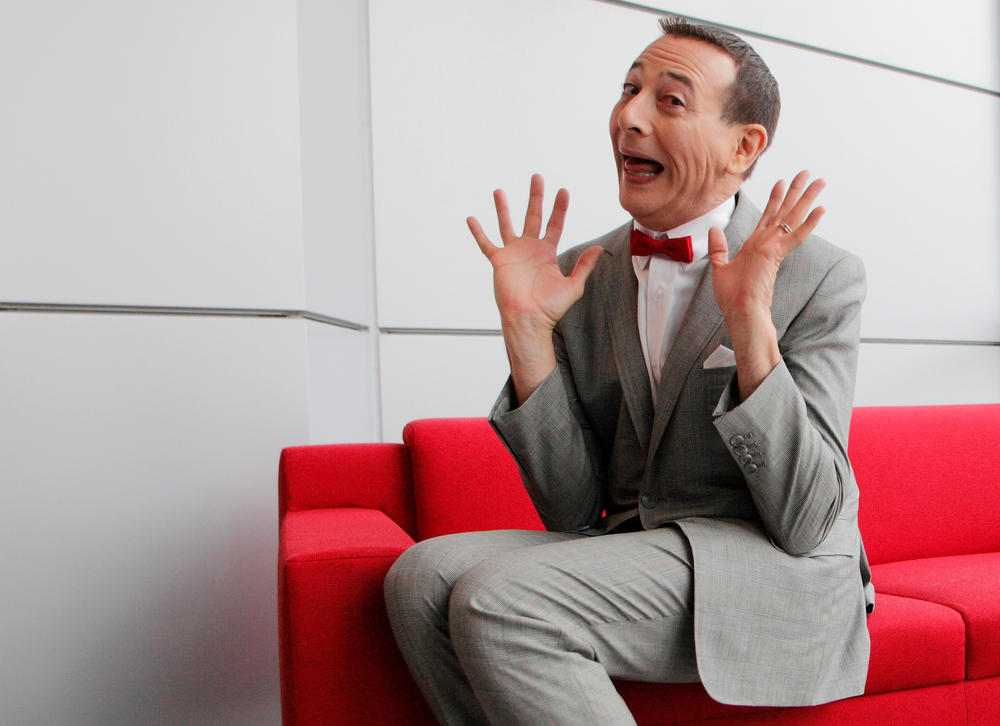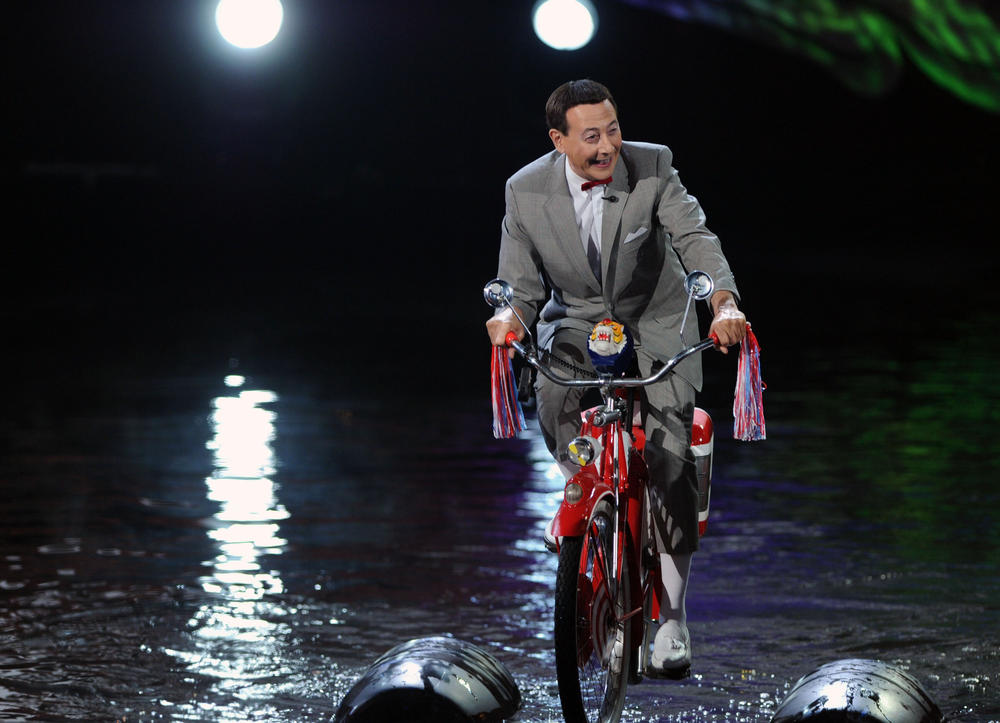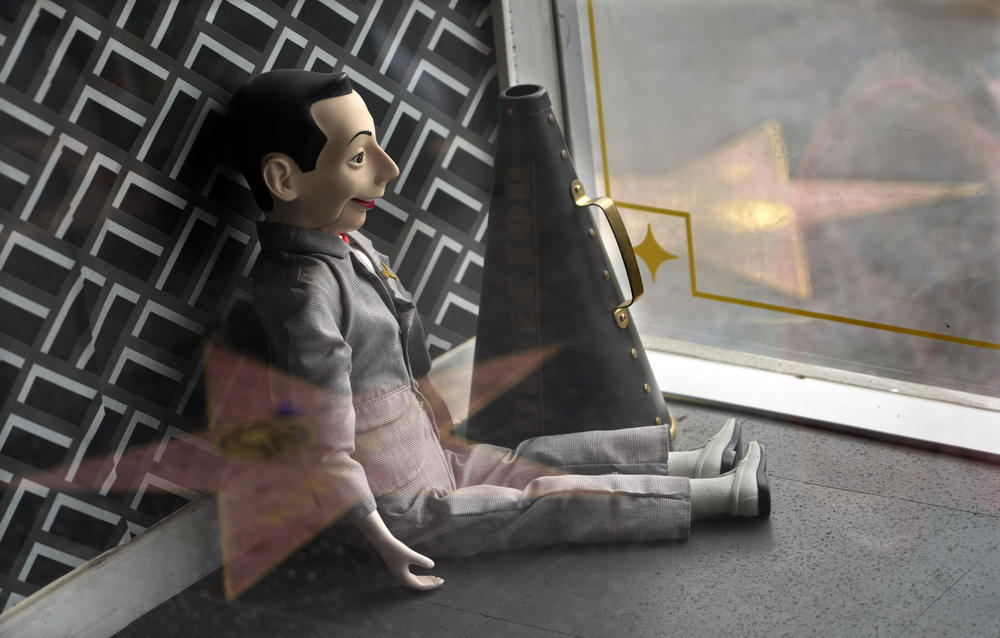Section Branding
Header Content
Pee-wee Herman was more than a boy who never grew up
Primary Content
Updated August 1, 2023 at 9:54 AM ET
Pee-wee Herman, the comic creation of actor/writer Paul Reubens, would often toss taunts of the schoolyard into his casual conversation. It was one of the character's go-to bits.
"Why don't you take a picture? It'll last longer!"
"That's my name! Don't wear it out!"
And, most iconically,
"I know you are, but what am I?"
Of course, when it came to Pee-wee himself, with his tight gray suit, red bow tie, crew cut, rouged cheekbones and ruby-red lips, "What am I?" was the real question – it was the one he posed merely by existing.
Reubens died Sunday of cancer at the age of 70. He was an actor – but for a long time, he tried to convince the public that Pee-wee was a real person, not a character.
Folks didn't know what to make of Reubens' petulant man-child at first. Created in 1977, while Reubens was a member of the Los Angeles sketch troupe The Groundlings, Pee-wee was part prop comic, part brat and part trickster spirit. There was something fearless in Pee-wee, something unapologetic and brash that took you a second to process. The character was very obviously and intentionally what folks used to call a sissy – but how could a sissy own the stage like he did? Bask in the spotlight like he did? How could a sissy so confidently and explicitly dictate the terms for his audience on how to experience him?
The Pee-wee Herman Show at The Groundlings Theatre soon had LA hipsters lining up around the block for a midnight show that mixed puppets and parody with archival educational films – the precise fuel mixture that powered Reubens' later CBS Saturday morning show, Pee-wee's Playhouse.
It was never Peter Pan, what he was doing. Yes, Pee-wee was a boy who never grew up, but he was more than that — he was one singular adult's remembrance of what it was like being a kid. Specifically, of those parts of childhood we pretend not to see in our own children — the narcissism, the selfishness, the utter lack of basic human empathy. The monstrous bits.
In Pee-wee's Big Adventure, it manifested in his hilariously obsessive drive to recover his stolen bike — a quest which would cause him to trample on the feelings of friends like Amazing Larry (Lou Cutell) and Dottie (E.G. Daily). On Pee-wee's Playhouse, it took the form of gleeful admonitions to his viewers to "scream real loud" whenever anyone said the week's secret word. (Spare a thought for the long-suffering parents who'd hoped that sitting their kids in front of the TV would allow them a moment's peace to finish their coffee.) On 1988's magnificent holiday staple Pee-wee's Playhouse Christmas Special, Reubens zeroed in kids' ravenous greed for presents, turning Pee-wee into a monster who only reluctantly sees the light once guilted into it. (Like Scrooge, he's a lot more fun to hang around with before his last-minute epiphany.)
To watch Pee-wee was to re-experience childhood the way we'd forgotten it actually was – pure, concentrated, distilled to its essence, when riding your bike and playing with your toys and screaming real loud was all it took to fill a day. Pee-wee was a creature of impulse, anarchy and id – which is probably why Reubens' frequent appearances on Late Night with David Letterman helped launch him to stardom.
Reubens' silliness worked on a different frequency than Letterman's – Pee-wee was wilder and far less inhibited than Letterman could ever hope to be, and Letterman knew to play up his own tetchy, aggrieved discomfort at Pee-wee's hijinks for comedic effect. The two men vibrated at opposite ends of the comedic spectrum, but they worked together brilliantly. In those interview segments, which quickly devolved into Pee-wee's signature giggles, you laughed at Reubens' ability to take complete control of the experience, and at Letterman's entirely uncharacteristic willingness to give over the reins.
In the coming days, our social media feeds will fill up with a lot of Pee-wee's greatest hits – Large Marge; "Tequila!"; Jambi the Genie; Chairy; Reubens' extended and entirely improvised death scene in the Buffy the Vampire Slayer movie; "I'm a loner, Dot. A rebel."; and, of course, "Come on, Simone. Let's talk about your big 'but.'"
Me, though, I'll be putting on the aforementioned Pee-wee's Playhouse Christmas Special, because it will remind me of one of Reubens' most overlooked talents – his ability to sneak an artisanal blend of fey subversiveness into the mainstream. That special injected a defiantly, yet matter-of-fact, queer sensibility into the CBS primetime airwaves of Reagan's America: The Del Rubio Triplets! Zsa Zsa Gabor! Little Richard! Annette Funicello and Frankie Avalon! KD Lang! Charo! The LA Men's Chorus dressed up as a Marine choir! And, most indelibly, Grace Jones as green Gumby, drag singing a club mix of "The Little Drummer Boy."
Keep your "I meant to do that." Keep your dancing on the biker bar to "Tequila." The image of Reubens that I'll be holding closest to my heart over the next few days is of him rocking out in the background as Jones sings in the glare of the spotlight.
Because I swear you can see, in just the way he holds his body, the mischievous delight he's taking in what he's unleashing on an unsuspecting public: Grace Jones, ladies and gentlemen, delivered unto your living rooms, pulling up to the bumper of your cozy family holiday special, an entirely singular brand of weirdness served up to you hot and fresh, with a high, unselfconscious giggle.
Jennifer Vanasco contributed to earlier versions of this story.
Copyright 2023 NPR. To see more, visit https://www.npr.org.




